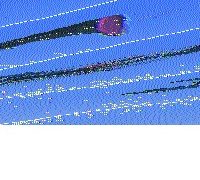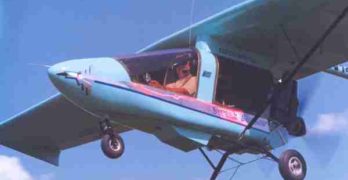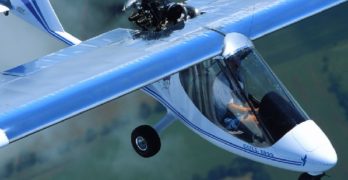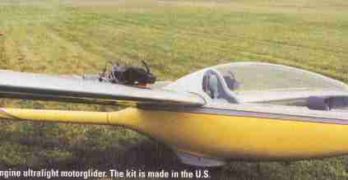In a calculated move planned for over a year, powered parachute leader Buckeye Industries introduced their new trike line at AirVenture ’98. This marks two points of interest to EXPERIMENTER readers.
The first point is a significant entry to the trike market, a segment of ultralight aircraft that has finally shown real growth potential after many years of effort by trike makers. Though European companies threw open the door with persistent marketing efforts mimicked by a few Yankee builders, Buckeye’s entry to the field could increase the number of trikes sold by a good margin.
Secondly, as a widely acknowledged sales leader among powered parachute builders, Buckeye is making something of a statement to that community of aviation enthusiasts. Powered parachutes deserve a follow-on aircraft and Buckeye has decided (logically, to my view) to make that successor a trike.
And, Why Not?
If you owned Buckeye and already made a slick, wheeled carriage for your powered parachutes, wouldn’t you also leverage that design to work for a trike?
Search Results for : electric
Not finding exactly what you expected? Try our advanced search option.
Select a manufacturer to go straight to all our content about that manufacturer.
Select an aircraft model to go straight to all our content about that model.
Laron Aviation – Streak Shadow
A unique looking machine, the Streak Shadow design hails from England. This gives another unique quality among ultralights available in the USA: it comes with British CAA approval. Their Section S procedure is most demanding and the Streak owns a certificate.
Heavily part-sourced in this country by U.S. distributor, Laron Aviation Technologies, it becomes almost Made In America. With its high tail boom, twin rudders, and composite cockpit, no one mistakes a Streak Shadow at an airshow.
Flying in a certified aircraft, I felt more comfortable pushing the envelope. I almost never check for Vne; I’m no test pilot. I didn’t go to the listed 140 mph (!), but found this to be the fastest ultralight I’ve flown. Less rigorous flying showed speeds approaching 90 mph.
At whatever speed, the handling was very good as was ground handling. Equally easy was entry to the forward seat where you find yourself luxuriously surrounded by a nicely-finished composite structure.
Built for two
After ten years of producing exclusively single seaters, Tennessee-based TEAM Aircraft broke with tradition and rolled out their very first two seater, the Tandem Air-Bike, at Sun ‘n Fun ’96, following the company’s successful Air-Bike design debuted two years earlier.
Wayne Ison’s TEAM got a lot of attention from the Air-Bike – it being regarded as an aircraft you get on, not in. That same sporty, fun-to-fly concept has now stretched into a two-seat model.
Some buyers will use the Airbike Tandem for instruction under the training exemption to Part 103. Others will N-number the machine and use it for the occasional joy ride with a passenger. It should work well either way. In fact, the close-quarters tandem seating means that when the aircraft is flown solo, it should perform well and yet feel more like the agile single seater than some other designs. This theory has worked well for Kolb and their Firefly II, for example.
Gull flying in a new millenium
It is Mark’s design philosophy to make the most efficient aircraft he can, one that will use the least fuel. He defines himself as “a minimalist,” and this sentiment is carried throughout this beautifully optimized aircraft.
To me, Mark appears to have grown increasingly comfortable in his role within ultralight aviation. Relaxed and confident, he knows he has created a superior flying machine.
He also smiles a lot more these days in my opinion, thanks to a wonderful woman named Leslie who accompanied him to AirVenture 2000 in Oshkosh, Wisconsin. Married a year and a half ago, the two complement each other and make a good team.
No more tight squeezes
Perhaps it was this new personal relationship that motivated Mark to pay more attention to creature comforts. Notably, the Gull 2000 is wider than the previous single-seat or tandem two-seat Thunder Gull aircraft. Considering Mark is a lean and healthy vegetarian, his concern for broader pilots is no doubt appreciated.
Polaris Slip
Here’s Polar Star’s entry in the minitrike sweepstakes.
You probably know Polaris even if you aren’t aware of the company name. Odds are good you’ve seen a picture of the Polaris inflatable flying boat. This is a trike with a small boat built around a steel trike frame. It looks unusual and remains unique.
Polaris claims to have shipped over 600 of these flying inflatable boats, once known as the Air Dinghy. The company reports these are flying around the world, owned by tourist resorts, Navy and police departments, Greenpeace ships, yacht owners, research marine institutions, and private pilots.
The company originated in Italy but opened an American office after founder, Doi Malingri, retired in Florida. Along with several Americans including Dave Melillo and Vince Kaufman, Malingri has established a U.S distribution center called Polar Star Group, a division of Polaris Motor.
Established in 1982, Polaris is experienced in aircraft manufacturing.
Esprit
Meet the Esprit – a twin-engine ultralight motorglider.
Soaring enthusiasts who want to self-launch their aircraft are limited to simple hang gliders on one end and expensive motorgliders on the other. Performance for these machines ranges 15:1 to 50:1. To get one you’ll spend $5000 or $200,000. What you could not do is spend $20,000 to get medium performance*… until now.
Debuting his machine at AirVenture 2000 airshow, Dobro Hajek brings a modern soaring aircraft to the ultralight community. I believe he will also find significant interest from two other groups: sailplane and hang glider pilots. Each loves dedicated machines without engines but many will also prefer an aircraft that can launch itself.
Welcome, Esprit
With its distinctive compound-tapered wings and winglets and its dual engines with folding props, the sleek Esprit goes a long way past the Aero Dovron that Hajek (pronounced HAY-yek) once imported. The Straton D-8 was an interesting little motorglider with a high wing and struts but at 17:1, this inexpensive machine didn’t have the go power it needed to attract a solid market in the United States.
- « Previous Page
- 1
- …
- 65
- 66
- 67






